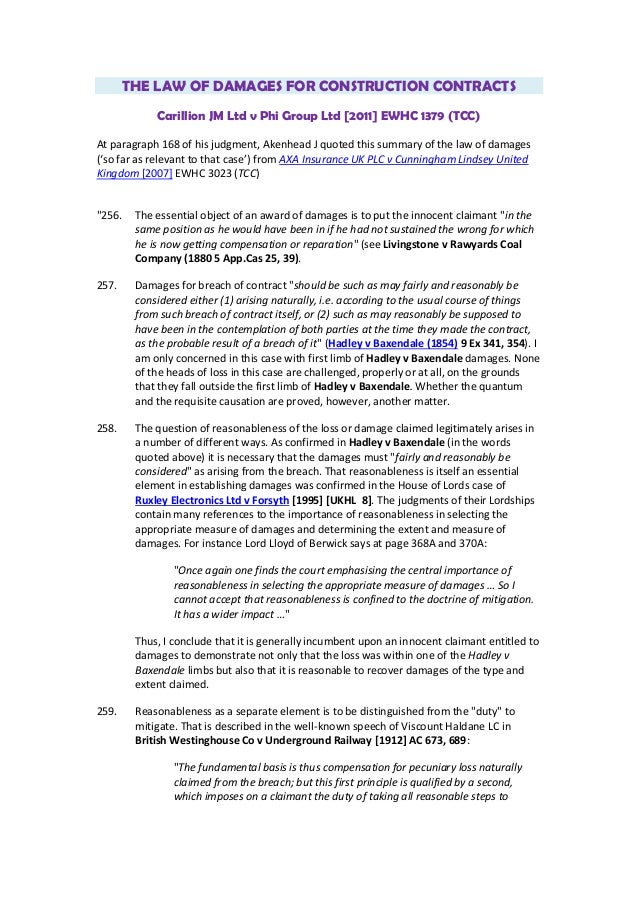

total or partial failure of performance.impossibility of performing one’s obligations due to their own act and.renunciation by a party of their liabilities under the contract.The judgment in SK Shipping refers to three sets of circumstances giving rise to a right to rescind a contract, as set out by Lord Porter in Heyman v Darwins Ltd.

Flaux J said that S had subjectively believed that D would not perform the charterparty and was therefore entitled to treat the contract as repudiated. These were all matters that provided a background to which D’s words and conduct were to be considered. Flaux J explained that the matters in particular that reasonably caused S to be concerned that D would not perform were: the order to the vessel to reduce its speed the failure to put up the letter of credit the failure to return a signed copy of the charterparty that would have entitled D to exemption from freight tax in Pakistan and the proposals for alternative charters. D argued that S had wrongfully treated the contract as repudiated while there were still days left to run on the charterparty, and that none of its actions or words made it clear that it would not perform the charterparty as agreed.įlaux J held that taking into account the words and conduct of D over the course of the negotiations and (non-)performance of the charterparty, D had evinced a clear and absolute intention not to perform the charterparty.These included: slowing the vessel down while en route to its loading port failure to carry out the relevant steps for loading of the cargo and attempts by D to renegotiate the charterparty, because no buyer for the cargo of goods could be found. S submitted several facts that gave the impression that the charterparty would not be performed.
 S argued that, following the charterparty being agreed, it became clear to it that D had no intention to perform the charterparty. The claimant shipowner (S) claimed damages for the anticipatory breach of a charterparty by the defendant charterer (D). The facts of SK Shipping are complex, but to summarise: Only once these conditions are satisfied can the innocent party take steps to terminate the contract and mitigate its losses. In addition to this, the innocent party must have a subjective belief that the other party will breach the contract. It made clear that the innocent party is only able to terminate the contract if it can show that the other party acted in such a way so as to provide a clear and absolute intention that it would not perform its obligations, and that the words or conduct of the party would be clear and absolute to a reasonable person taking into consideration all of the circumstances at the time of termination. In SK Shipping, the Commercial Court examined the law of anticipatory breach and provided useful guidance on when an anticipatory breach may arise. This issue has been dealt with recently in the case of SK Shipping (S) Pte Ltd v Petroexport Ltd. The crucial question is, at what stage will the innocent party be able to claim that there has been an anticipatory breach? If an anticipatory breach occurs then the innocent party can treat the contract as repudiated and seek alternative deals, or take other remedial action. The courts have again recently confirmed that, in certain circumstances, and provided the ingredients of a repudiatory breach are present (see pp8-9, IHL174), the innocent party may treat the contract as repudiated as a result of an anticipatory breach of contract.Ī contracting party will be better placed to mitigate its losses if it is aware that the contract will not be performed prior to those obligations falling due. There are times when one party to a contract will know that the other has no intention of performing, even though the time for performance has yet to expire.
S argued that, following the charterparty being agreed, it became clear to it that D had no intention to perform the charterparty. The claimant shipowner (S) claimed damages for the anticipatory breach of a charterparty by the defendant charterer (D). The facts of SK Shipping are complex, but to summarise: Only once these conditions are satisfied can the innocent party take steps to terminate the contract and mitigate its losses. In addition to this, the innocent party must have a subjective belief that the other party will breach the contract. It made clear that the innocent party is only able to terminate the contract if it can show that the other party acted in such a way so as to provide a clear and absolute intention that it would not perform its obligations, and that the words or conduct of the party would be clear and absolute to a reasonable person taking into consideration all of the circumstances at the time of termination. In SK Shipping, the Commercial Court examined the law of anticipatory breach and provided useful guidance on when an anticipatory breach may arise. This issue has been dealt with recently in the case of SK Shipping (S) Pte Ltd v Petroexport Ltd. The crucial question is, at what stage will the innocent party be able to claim that there has been an anticipatory breach? If an anticipatory breach occurs then the innocent party can treat the contract as repudiated and seek alternative deals, or take other remedial action. The courts have again recently confirmed that, in certain circumstances, and provided the ingredients of a repudiatory breach are present (see pp8-9, IHL174), the innocent party may treat the contract as repudiated as a result of an anticipatory breach of contract.Ī contracting party will be better placed to mitigate its losses if it is aware that the contract will not be performed prior to those obligations falling due. There are times when one party to a contract will know that the other has no intention of performing, even though the time for performance has yet to expire.







 0 kommentar(er)
0 kommentar(er)
